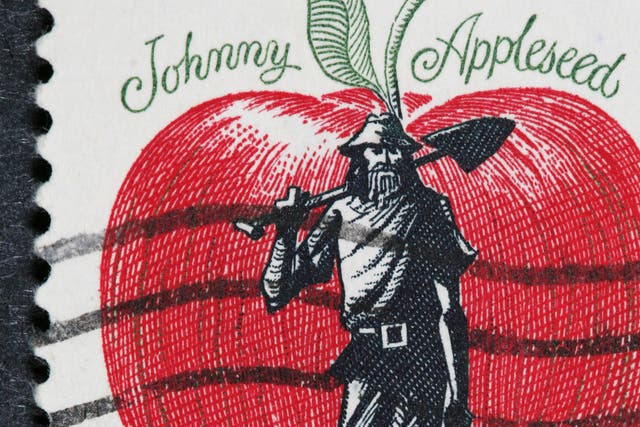

It may surprise you that one of the most notable entrepreneurs of the American frontier didn’t wear a jacket, tip his hat and shine his shoes, but rather dressed in a coffee sack, donned a tin hat and traveled barefoot. John Chapman, better known as Johnny Appleseed, was a 19th-century horticulturist who made great contributions to the westward expansion of the United States. Though he may not have traveled down the Allegheny River on a block of ice like his folk-hero persona, Chapman paved the way for countless frontiersmen to settle new land around his orchards.
Chapman, the son of a farmer, was born on September 26, 1774 in Leominster, Massachusetts. He moved to Ohio at the beginning of the 19th century, bringing seeds from Pennsylvania cider presses with him and planting them along the way. Though his legend may paint a picture of Johnny Appleseed planting at random and selflessly handing out seeds to needy settlers, in reality Chapman’s path followed a strategic business plan. Children’s books about Appleseed have, of course, removed the element of alcohol from the story, but Chapman’s success was centered not around fresh apples but rather the cider they could create. Cider was an essential at the American dinner table at the time, so most homes had their own small orchard. Chapman planted orchards along the pioneers’ routes, staying ahead of other orchardist competition since his nomadic, unmarried lifestyle allowed him to cover more ground. He would then trade his seedlings with new settlers in the area so that they could grow apples for their new homes.
It wasn’t all just business for him, though. Chapman did show kindness to these struggling pioneers and would sometimes grant them the seedlings for free; this benevolent nature earned him the nickname “Johnny Appleseed” from grateful frontiersmen. He was also a missionary for the New Church, spreading its religious ideals along with his apple seeds, and did his part to maintain peaceful relationships between Native Americans and new settlers. He also practiced vegetarianism and advocated for animal rights. In 1871, W.D. Haley wrote a colorful chronicle of Chapman’s life for “Harper’s Weekly,” propelling the legend of Johnny Appleseed into American popular culture. He has since been an iconic subject in American literature, music and film as both a real and fictional representation of the American pioneer spirit.